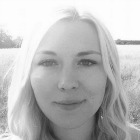HSBC: Put your money where your mouth is on human rights
Time to up the heat on HSBC, writes Marienna Pope-Weidemann, as War on Want call on the bank to stop arming Israel.

Against incredible odds, Palestinians continue to resist Israel’s system of oppression, demanding freedom and justice and calling on people of conscience here in the UK to do all we can to stop UK corporations from supporting – and profiting from – Israeli apartheid. That’s what this campaign is all about.
During recent demonstrations in the Gaza Strip, the Israeli military has once again shown the world its willingness to turn deadly force on unarmed civilians.
Despite calls for restraint from the UN, at least 30 Palestinians were shot and killed by Israeli security forces, with one video surfacing which showed an onlooker cheering as an Israeli sniper shot an unarmed Palestinian protester.
To find those responsible, we don’t just need to look as far as the Israeli state or even the UK, which arms it. If you have an HSBC branch on your high street, there’s complicity much closer to home.
Financial institutions are a crucial link in the chain of complicity in Palestinian oppression; this includes some of the UK’s biggest banks. HSBC holds £831 million pounds worth of shares in companies selling weapons and military technology to Israel, such as BAE Systems, Boeing, and Elbit Systems. Weapons and military technology made by these companies are used in Israeli attacks on Palestinians, not just when global headlines flare up around major offensives, but also as part of the daily brutality and violence of Israel’s apartheid system.
This includes extrajudicial executions, mass arrests, use of live ammunition to disperse unarmed crowds, and house demolitions using armoured bulldozers.
Israel’s illegal military blockade and large scale bombings of the Gaza Strip have contributed to a historic humanitarian crisis. Two million residents live in Gaza without reliable electricity. 70 percent of the population has no access to clean water, more than half suffer from food insecurity and tens of thousands have been left displaced, injured and traumatised by successive bombardments.
One of the most damning companies in HSBC’s list of shareholdings is Elbit Systems, one of Israel’s largest arms manufacturers, which has made white phosphorous for military use and cluster munition cannons sold to the Israeli military. Cluster munitions are banned under an international treaty signed by the UK because they disperse smaller bombs over a wide area, posing a deadly threat to civilians in densely populated areas.
In response to War on Want’s queries, HSBC has hidden behind a Defence Equipment Sector Policy, which states that HSBC does not provide financial services to arms companies. It was War on Want’s Deadly Investments investigation which revealed HSBC was still listed as a shareholder in at least 19 arms companies that sell weapons to Israel. Our investigation exposed that the policy has built-in loopholes that allow for it to continue to actively maintain business relationships with some of the world’s largest arms companies.
Over 18,000 people have already taken action by writing to HSBC Group Chief Executive John Flint, and over 20 HSBC branches across the UK have been regularly targeted by campaigners inspired by the Palestinian call on campaigners to take up divestment campaigns focused on banks and other companies involved in arming Israel.
The focus on HSBC comes at a shaky time for the bank, as it is also embroiled in a host of tax-dodging scandals, and was at the centre of reports on companies with the worst gender pay gaps. With these reputational issues already at play, HSBC has been growing increasingly nervous about the Stop Arming Israel campaign. And to us, that means one thing: time to turn up the heat.
This Friday from 10am-2pm, War on Want, Palestine Solidarity Campaign, and Boycott Israel Network will be protesting outside the HSBC Annual General Meeting to raise awareness and put pressure on shareholders.
With the UN Secretary General calling for an independent inquiry into Israel’s use of force against unarmed Palestinian protesters this month and the UN compiling a list of companies complicit in Israeli violations of international law, the Palestinian call for divestment has never had broader support. The time has come for HSBC to put its money where its mouth is: stop arming Israel and end its corporate complicity in oppression wherever it exists.




